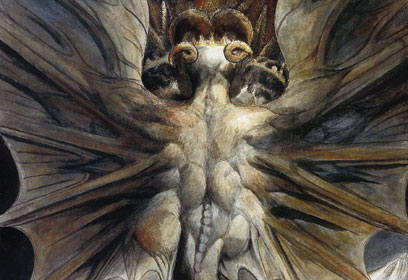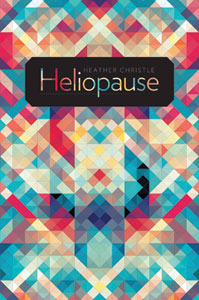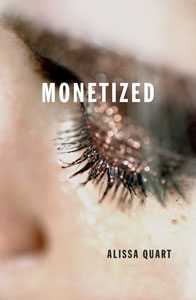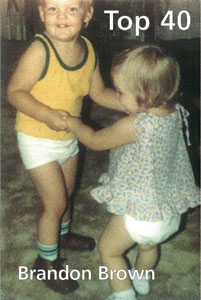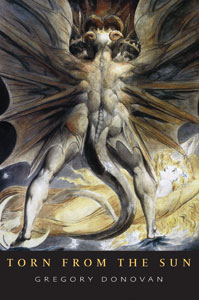In Heather Christle’s fourth volume, her fast-paced, lambent voice gains gravity by exploring space. In “Elegy for Neil Armstrong,” which anchors the volume, Christle transforms the transcript of the first moon walk, using erasure to expose the uncanny tensions lurking beneath the surface. One passage becomes, “Neil, we can / see you // get up”—a humorous nod to Frank O’Hara’s Poem [“Lana Turner has collapsed!”] tempered by reference to Armstrong’s death, which the speaker of another poem notes happened “the same day Voyager finally reached the limit / of our solar system” (the eponymous heliopause). Christle has always found humor in unexpected places, but the poems of this volume seek out the sadness that undergirds humor, exploring the lacunae between levity and loss, the alphabet and the objects words represent, life and what remains after death. She also inquires into the workings of creation and destruction in an effort to find poetry’s purpose, as in the first “Dear Seth” poem: “I know the general uselessness / of looking to words for answers / but on occasion / the cast spell works.” The long pieces, around which the volume is arranged, effectively employ conceptual methods, especially in a series of fragments about September 11 inspired by composer William Basinski’s ambient “Disintegration Loop 1.1.” Even the volume’s shorter poems beguile with humor to expose the danger of lightness, creating an ironic tension, as in the title of the poem “A Perfect Catastrophe.”
—Kirsten Bartholomew Ortega
About two minutes into the song “All I Could Do Was Cry,” Etta James belts the word “rice” in a roar so profoundly mixed with emotion that after even a single listen, rice can never be just rice again. In moments such as this we remember that art is a living tradition, continually performed and negotiated from within our everyday lives. “I love you more every day, not less / and this concerns me,” Erika Jo Brown writes in the first poem of I’m Your Huckleberry. “You mug. Plus, / we live on a flood plain. It may all seem / non-germaine but G-d, sometimes / it’s cloudy, sometimes luminous.” Like James’s rice, each poem in Brown’s book twists common objects into unfamiliar shapes, sending them on a romantic trajectory. Whether contemplating light at the bottom of a community center pool, giving Buddhist lectures, or navigating relationship turmoil in the Midwest while attempting to construct “the present as a present for you,” Brown celebrates the muddy, complicated things lived down here on earth. If there is a central concern to I’m Your Huckleberry, like “the saccharine squeamishness / of accepting butterscotch from old people,” it is how to be proactive in creating joy. Through a barrage of puns, rhymes, wordplay, and jokes, Brown reminds us that, in poetry as in life, “You can’t choose delight, you / must walk outside and wait for it to find you.”
—Jake Levine
With finger on the pulse of cultural currency, Monetized marks Alissa Quart’s poetic debut, following successes in nonfiction and journalism. A trajectory of increasing commodification unravels in the book’s three sections, leaving us “hanging on by a high / thread count” and artificially quantified as “all stars, all likes. All nothing.” Although society has long been high on the spoils of privilege (“the word ‘classic’ accompanies the word ‘commercial,’ after 1943”), Quart tracks the ruins of capitalism’s digital dusk after the dawn: “Drones capture all / yet vets’ coffins are effaced / from our vastest database.” Whether from a bird’s-eye view or the bedroom, the level of interconnectivity contributes to objectification in a plea for mass appeal: “Here’s to reproduction: photography, Twitter, pregnancy. // Women may mother in order to be loved.” Loss of privacy, identity, and financial security stream throughout this collection. However, the irony of our predicament (“our sport / shirts point to always / sitting still”) is delightfully disclosed not only in the speaker’s waggish yet tempered tone, but also in the sheer refinement of free verse. Riddled with tropes, schemes, and internal rhymes, the economized syntax delivers a sonically charged discourse for redistributing our value system. In an era of imitation where “money cancels criticism” and TMZ replaces literature, “writers are still worrying about the word not meeting the thing it describes. Who else cares.” Monetized reminds us to remember.
—Jeanine Deibel
With the birth of the top-forty radio format, poetry officially passed the baton of Romanticism to the pop music industry. Watery carpe diem in 4/4 time, “love” and “song” congeal into a mechanical heart that, as Phillip Phillips sings, “like a drum, baby, don’t stop beating.” In his latest collection, Brandon Brown pays tribute to that steady flow for the formative role it played in his development, the way Wordsworth hat-tips the River Derwent whose “ceaseless music composed [his] thoughts” in infancy. The book’s forty poems take their titles from a September 2013 countdown: Macklemore positioned within an appropriation lineage, Justin Timberlake’s “Take Back the Night” with a Marxist spin. Brown’s poems embrace populism, meditate on taste, scorn elitism. When an acquaintance asks that a recommendation for a neighborhood to live in be “within walking distance to bars and boutiques, . . . a place ‘where white people lived,’” Brown responds with a “‘gonna throw up’ face.” For him, social conscience and fondness for the aesthetically trivial converge. While the bourgeois argue that pop “fails to reflect the miserable conditions of the real world, [and] is instead a collection of highly addictive distractions,” Brown both assents and dissents, a rebuttal that reveals the complexities of pop’s contexts. Pop doesn’t just play in clubs and teenage bedrooms; it plays at the grocery store and at Occupy protests. Yes, the capitalist malaise surrounds us, but when Drake implores us to “just hold on, we’re going home,” it is a Romantic assurance that things will be okay, if only for three minutes. For Brown, fleetingness is strength. Disposability is liberating. Because pop changes nothing, “Everything Has Changed.”
—Patrick Gaughan
Gregory Donovan’s Torn From the Sun draws from a standard repertoire of inherited forms—couplets, quatrains, tercets, the occasional persona poem—but as the book unfolds, the constraints Donovan has imposed on his language become a powerful metaphor for violence and our wide-ranging uses of rhetoric to contain it: “Alarm calls, chase calls, flight calls, wing whistles, / bill snaps—and among their clacking & clicks / comes a ceaseless mimicry of our human speech, talk talk.” Invoking an assortment of speakers situated in vastly different temporal frames, Donovan invites us to see history as a text in which motifs surface and resurface, themes of violence and its subsequent suppression foremost among them. One poem’s pristine couplets lend order, however arbitrary, to an intrinsically threatening world: “After the fire and the Big Bang and all that / things changed. Photos curled up and lost face, metals shifted / color, trophies melted, glass crackled, wood whistled and sang. // All along, that roar.” Here Donovan presents creation, the precise moment the universe came into being, as the originating act of aggression, an energy that continues to pulse through the smallest things. His poems call attention to the artifice inherent in our efforts to maintain a semblance of mastery over the world and oneself: “Wheels within wheels spinning a cold flame, / Feather of soot that each of us must hold, each dark / That shatters in that red tide.”
—Kristina Marie Darling
